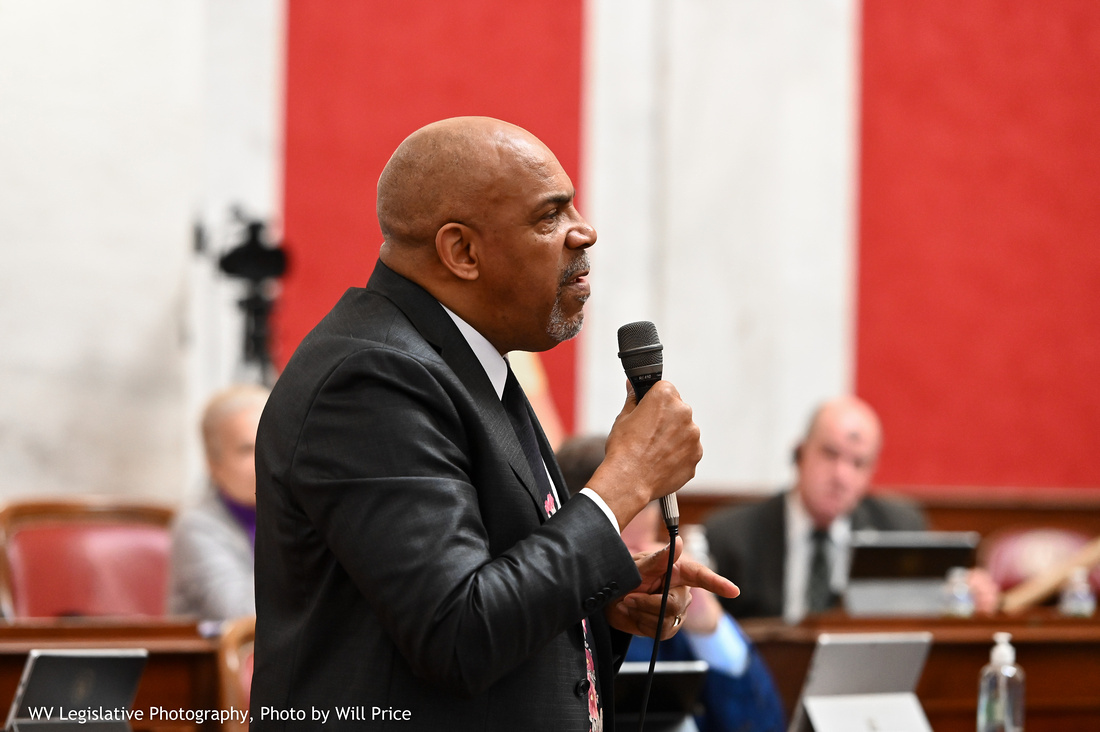Senate deals with anti-racism bill, PEIA, anti-abortion bills

Photo Courtesy/WV Legislative Photography BROWN — State Sen. Owens Brown questioned the motivations of the Republican majority for pushing SB 498.
CHARLESTON — The West Virginia Senate quickly powered through its massive agenda Wednesday as it passed bills in time for the Crossover Day deadline.
The Senate passed 30 bills throughout the day Wednesday in order to get those bills sent to the House of Delegates in time for Wednesday’s deadline to pass bills and send them to the next body.
Senators passed Senate Bill 498, creating the Anti-Racism Act, in a 21-12 vote with state Sen. Bill Hamilton, R-Upshur, voting with the Democratic minority against the bill.
SB 498 bill prohibits the teaching that one race, ethnic group, or biological sex is morally or intellectually superior or inferior to another; or that one race, ethnic group, or biological sex is inherently racist, sexist, or oppressive either consciously or unconsciously. The bill prohibits teaching that an individual’s moral character is derived from their racial, ethnic, or gender identity or that they bear responsibility for actions committed by those of similar backgrounds. It would also prohibit making someone feel discomfort, guilt, anguish, or other forms of psychological distress because of their racial, ethnic, or gender identities.
And it prohibits labeling academic achievement, merit, or certain traits — such as hard work — as racist or sexist or created to oppress another racial or gender group.
State Sen. Owens Brown, D-Ohio, is the only black member of the state Senate and served as president of the West Virginia chapter of the NAACP. He accused the Republican majority of trying to address an issue that doesn’t appear to exist in West Virginia – the teaching and discussion of concepts derived from critical race theory (CRT) – in order to stir conservative supporters.
“I do believe that some politicians are using CRT as a tool in their campaigns,” Brown said. “It’s happening all over the country. CRT becomes a trope for so many of these campaigns…It’s been told to you over and over again its not being taught in the public schools, but here we are still trying to say its being inserted into public schools for political purposes and for political gain. That is not right, because you’re turning people against each other.”
State Sen. Amy Grady, R-Mason, is a fourth-grade teacher and said she doesn’t agree with concerns of bill opponents that the bill will discourage discussions on historical topics dealing with the nation’s complicated history with race. The bill ensures 1st Amendment protections and allows for the discussion on topics of race, ethnicity, and gender in an academic setting as long as alternative theories are allowed to be discussed.
“It’s important to teach history because we want to learn from history and not make the same mistakes of the past,” Grady said. “I have heard from teachers, I have heard from parents, and I have heard from students that they have been told because of their race that they are privileged. That is a terrible thing just as bad as saying a black student is under-privileged because of their race. We are doing everyone a disservice by doing that.”
The Senate passed Senate Bill 574, relating to the Public Employees Insurance Agency, in a 33-0 unanimous vote after previously rejecting the bill in a 14-20 vote nearly two weeks ago. The Senate reconsidered the vote on SB 574 Feb.18 and sent the bill to the Senate Rules Committee to iron out differences of opinion on the bill.
SB 574 would split PEIA into two plans; the State Employee Insurance Plan and the Nonstate Employee Insurance Plan. The bill requires PEIA to establish and maintain a reserve fund to supplement any reimbursements made to hospitals and emergency medical service providers or agencies.
According to the bill, PEIA would reimburse any hospital that provides inpatient care to a beneficiary covered by the plan at a rate of 110 percent of similar services offered by Medicare by July 1, 2023. The same would go for emergency medical service providers.
“Everybody recognizes that we need to be a little bit proactive … If we do not treat PEIA like an insurance plan, it won’t work,” said Senate Health Committee Chairman Mike Maroney, R-Marshall. “I’m excited for this bill. I’m glad that there was a bipartisan effort to get it across the finish line.”
“The initial version I had some issues with it. The beautiful thing about this is we have come together,” said state Sen. Ron Stollings, D-Boone. “This spreads it out over 220,000 people that when they get in the hospital or someone summons the EMS system, they will be able to get reimbursed at a level that covers the cost of the service … Good job to everyone.”
Senate Bill 468, the Unborn Child with Down Syndrome Protection and Education Act, passed 28-5. The bill would prohibit abortions because of physical and intellectual disabilities unless the physician can confirm that the abortion is not being conducted due to the physical and intellectual disability. The bill includes fines for physicians who intentionally and knowingly violate the law. Exemptions include the instance of a medical emergency or if the fetus has a severe fetal condition.
“We … are pro-life and we think every life is precious. We, as a Legislature, should protect those who are most vulnerable, and I don’t think there is anyone more vulnerable than a fetus in utero,” Maroney said. “Disabilities are not a reason to terminate a pregnancy.”
“I just don’t understand why we have to run a bill such as this … I don’t get it,” said state Sen. Mike Caputo, D-Marion, speaking against the bill. “This is such a divisive issue; there usually is no middle ground.”
(Adams can be contacted at sadams@newsandsentinel.com)


